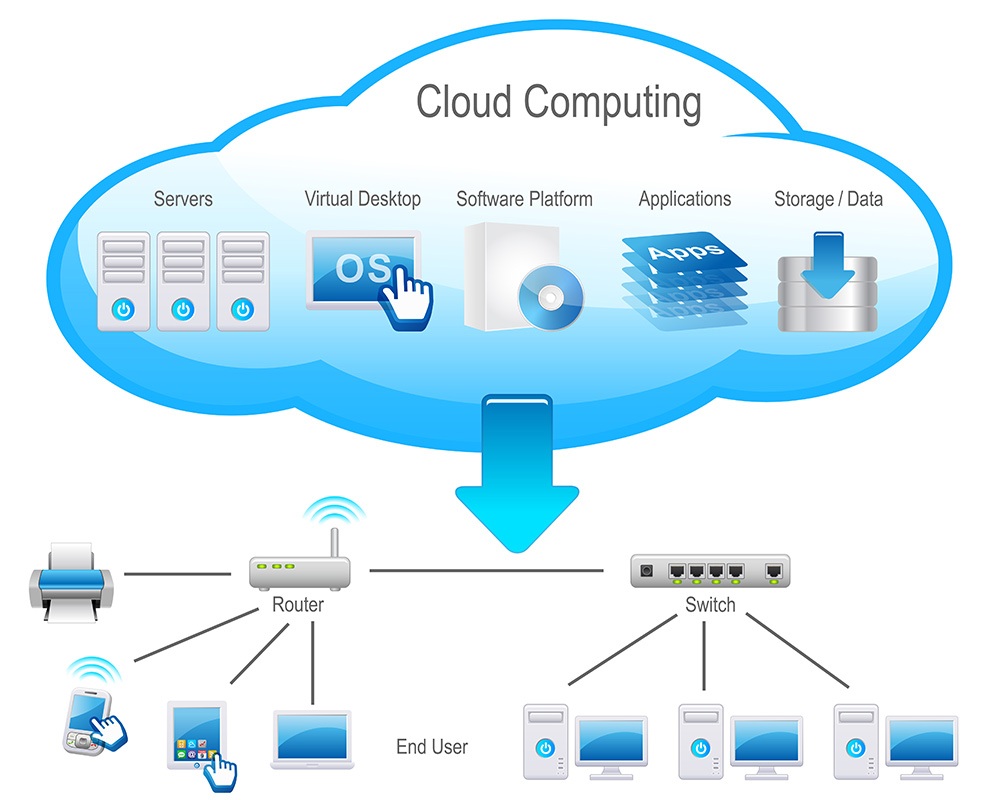What Are Managed IT Services?
Managed IT services allow businesses to delegate their IT operations to an expert third-party organization that specializes in handling various IT and technological responsibilities. These third-party organizations, often referred to as Managed Service Providers (MSPs), are responsible for the entirety or portions of a business’s IT systems.
A managed service provider brings peace of mind to business owners or organizations by taking responsibility for the entirety or portion of their IT operations of the business, including 24X7 monitoring, reporting, on-demand IT support, problem resolution, and more.
IT Companies in Houston
A significant differentiating feature of Managed IT Services compared to traditional IT services is that managed service providers, such as Wright Business Technologies (a leader in Managed IT Services Houston), assumes the responsibility of providing various IT services agreed upon in a Service Level Agreement.
Cloud computing has allowed Managed IT Service providers the ability to expand beyond the regions and borders that would constrain the average break or fix IT through the adoption of Software as a Service (SaaS) technologies, as well as Infrastructure as a Service (IaaS) and Platform as a Service(PaaS). These capabilities allow managed IT services to scale dramatically larger and faster than in-house IT operations or break it and fix it providers.
IT Consulting Houston
Strategic IT decisions also become the responsibility of service providers such as Wright Business Technologies who proactively communicates to the business owner through a robust IT strategy, planning, and execution. In essence, a Managed IT Service provider is a technology consultant to the business owner with regards to IT implementation and management, in addition to being on-demand when problems arise.
Managed IT Services Houston
More and more Houston business owners are searching Google for managed IT solutions. They are Googling “managed services Houston,” “IT services Houston,” “IT support Houston,” or managed IT services Houston” and many are realizing the benefits of opting for a Managed IT Services model instead of the traditional outsourcing of specific IT activities.
A Managed IT Service model reduces IT risk as well as a service disruption, allowing businesses and organizations higher levels of productivity.
Services That Are Best Outsourced
More and more Houston business owners are searching Google for managed IT solutions. They are Googling “managed services Houston,” “IT services Houston,” “IT support Houston,” or managed IT services Houston” and many are realizing the benefits of opting for a Managed IT Services model instead of the traditional outsourcing of specific IT activities.
A Managed IT Service model reduces IT risk as well as a service disruption, allowing businesses and organizations higher levels of productivity.
Services that are best outsourced or managed by a managed IT services provider have one or more of the following key characteristics in common:
- Labor-intensive
- Skill-intensive
- Not a core business activity
Labor-intensive IT tasks that require people, such as remote monitoring IT services, are better handled by a dedicated IT management service company who has the talent, knowledge, and operational infrastructure to handle demanding IT issues.
It often doesn’t make sense for small to medium-sized companies to hire and support an inside IT department. Instead, many businesses are opting for a significantly better option with a much lower monthly fee by contracting with a Managed Services Provider (MSP).
Skill-intensive IT tasks which require technical expertise, such as application design and support, can also be handled by outside experts.
Labor, particularly very-skilled or highly specialized technical labor, is expensive and it often doesn’t make sense for a company to hire their own in-house technical expertise. Instead, a Managed Service Provider can provide technical expertise to the company for a much lower cost (Answer 5 questions to get a managed IT estimate).
Finally, many business experts agree that companies should focus on what makes them great and devote their time and energy on advancing goals for their business. Anything else that could be a distraction for the business or a drain on resources could easily be handled by a Managed Service Provider who is better equipped and trained, and at a much lower cost than creating an internal IT department.
Top 5 IT Servies to Consider Outsourcing
1. Communication Services

We live in the digital age. Companies today cannot function without the essential lines of communication that connect us to the outside world, our customers, and each other.
However, managing, monitoring, and maintaining these communication networks is a chore. Remember, business and work communications are the lifeblood of any successful business or organization. Moreover, a system that is haphazardly thrown together cannot only impede day-to-day business; it can also have legal ramifications if proper paper trails are not maintained.
Ensuring that all the various communication networks speak to each other and work flawlessly often requires dedicated IT support and extensive setup. With this in mind, we recommend letting a Managed Service Provider handle these services to ensure seamless communications.
2. Servers

Massive amounts of business transactions occur online every day. For many businesses, the web is their primary or only way of doing business with their customers.
Server management and support, therefore, are essential. Maximizing server uptime, monitoring performance, and preventing hacking is critical for a business to survive and thrive. Of course, management, monitoring, and maintaining servers require expert staff.
By outsourcing to a Managed Service Provider, companies can gain a competitive advantage. Outsourcing servers ensure maximum uptime for minimal costs.
3. Service and Support

World-class service and support are both essential for a business to succeed and win customers but are expensive.
Most firms, including many large firms, do not have the workforce or properly trained service staff to handle such a demanding task.
Remember, your service and support play a pivotal role in productivity and morale. Partnering with a Managed Service Provider specializing in providing 24-7 support makes a lot of business sense
4. Cloud Services

Like managing servers and communication infrastructure, operating and maintaining cloud services is critical for the daily operations of many businesses.
While many enterprise-level cloud services require minimal physical support and can be delivered through the web, they can still be equally demanding.
The management of many cloud services still requires the oversight of knowledgeable, highly trained full-time staff. As a result, the setup, management, and monitoring of cloud-based systems and services is an excellent task to consider outsourcing to third-party experts and Managed Service Providers.
5. Digital Cybersecurity

Cybersecurity is more critical today than ever before. That’s no surprise considering the rapid move of almost all commerce into the cloud and onto the world wide web.
This move away from physical retail shelves has also made many businesses extremely vulnerable to cybercriminals and hackers. Companies cannot afford to have their cybersecurity compromised.
While a multinational corporation may have the funds to build world-class security systems and recover financially from major breaches, most other businesses cannot. Not only can the money be directly lost or stolen through fraud and security hacks, but breaches can also ruin a business’s reputation with consumers and break trust with customers. That’s why 60 percent of small businesses that get hit with a cybersecurity breach go out of business within six months.
Despite the rising dangers of the digital world, surveys show that the vast majority of small to medium-sized businesses are woefully under-prepared. More than 70 percent, or nearly three-fourths of all companies, are not prepared to deal with hackers. Moreover, dealing with potential hackers is an expensive business.
Most businesses cannot handle it alone and instead turn to third-party IT security providers for help. A single in-house employee and a subscription to consumer-grade anti-virus aren’t enough these days to keep your business protected.

